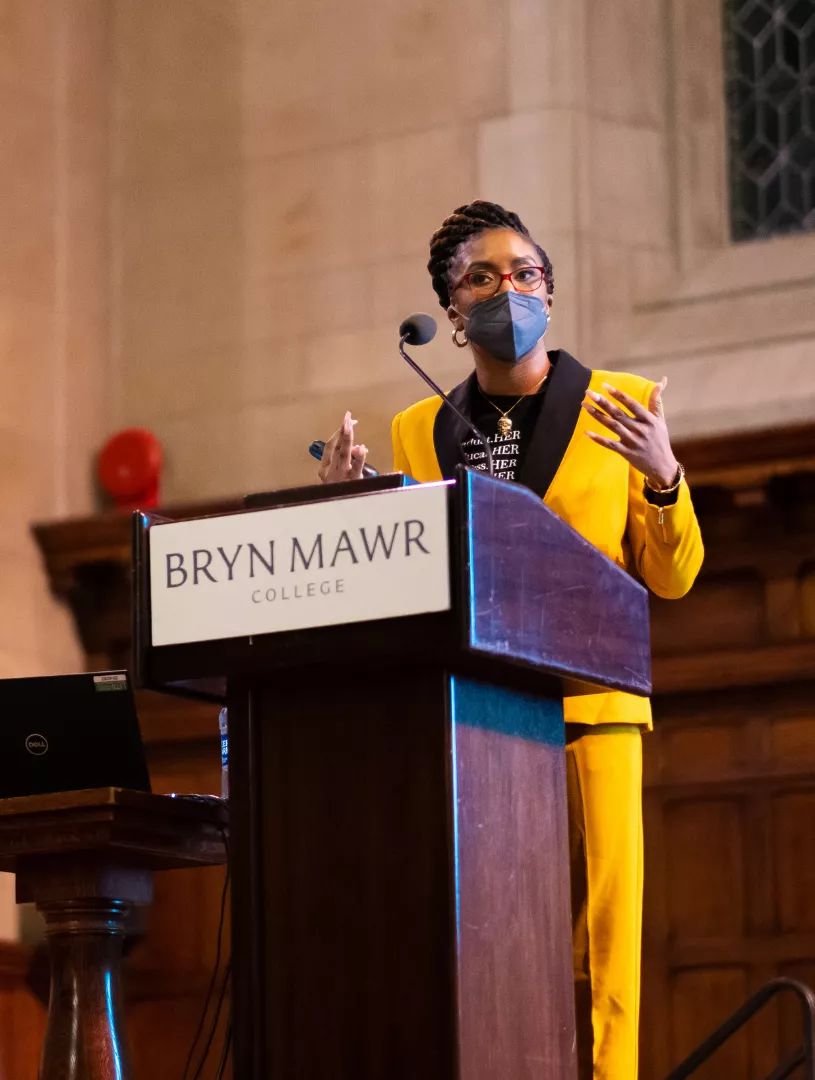
Shawna Murray-Browne delivered Bryn Mawr College’s Black History Month Keynote address on Feb. 24 in the Old Library Great Hall to a large crowd of students, faculty, and staff.
Murray-Browne’s talk was entitled "First, Reclaim Yourself: Lessons in Wellness from the Black Radical Tradition” and she used her own story of reclamation to inspire audience members to do the same.
Murray-Browne’s story begins on July 29, 2015. It was her birthday and as she put it, “life was still good because I was able to see the light in myself.”
She describes blissfully driving in her car on the way to the spa—a gift from her husband—to celebrate the day. Listening to her favorite song and hearing the pings from her phone as birthday wishes poured in on social media, she picked up a call on Bluetooth from her sister, who rarely remembered the occasion.
Her sister hadn’t called to wish Murray-Browne a happy birthday, though, she had called with the news that their brother Darell, who had been imprisoned, had been found dead in his cell.
Authorities would charge Darrell’s cell mate with the crime, but Murray-Browne always saw her brother’s death as a state-sponsored act of violence and the true murderer to be the criminal justice system.
In telling her story of coming back from this tragic event, Murray-Browne interwove life lessons from three Black cultural and civic-rights icons: Ida B. Wells, Rosa Parks, and Maya Angelou.
When talking about Wells, Murray-Browne talked about the profound effect the lynching of Thomas Moss, Will Stewart and Calvin McDowell in Memphis in 1892 had on the journalist.
“She set the understanding, the belief, that life’s tribulations are an invitation to transform,” she said. “No matter what hardship or experience you’ve had in your life, it is an invitation for you to transmute that fire into fuel to change the world.”
In the months following her brother’s death, Murray-Browne was not ready to act on the wisdom of Wells, instead retreating from the world and balling her grief inside. She traveled to the Justice or Else march in D.C. that fall, and while she felt moved by an entire Metro train “filled by Black folks from around the country in red T-shirts and hoodies,” she was unable to feel a meaningful connection.
It was the wisdom of Maya Angelou that finally allowed her to begin to reconnect with others, she says. “What Maya Angelou is teaching us is that we have to let the love in. So, if you’re struggling, you feel overwhelmed, you feel like you can’t see a way through, you’ve got to talk to somebody in your village and community.”
Murray-Browne closed her talk with an impassioned remembrance of her brother’s alleged killer’s trial and how she lashed out at the judge and corrections officers for their complicity in his death.
Having been through such a depleting ordeal, she drew sustenance from the wisdom of Rosa Parks.
In a letter to Congressman John Conyers, for whom she had once worked, Parks detailed the many activities she had planned and added at the end, “and then I’m going to rest for a few days.”
“Rest is resistance,” said Murray-Browne. “You have to establish a practice of rest if you’re going to reclaim yourself. … That is how we reconnect and reflect more deeply and sustain ourselves and our movement.”